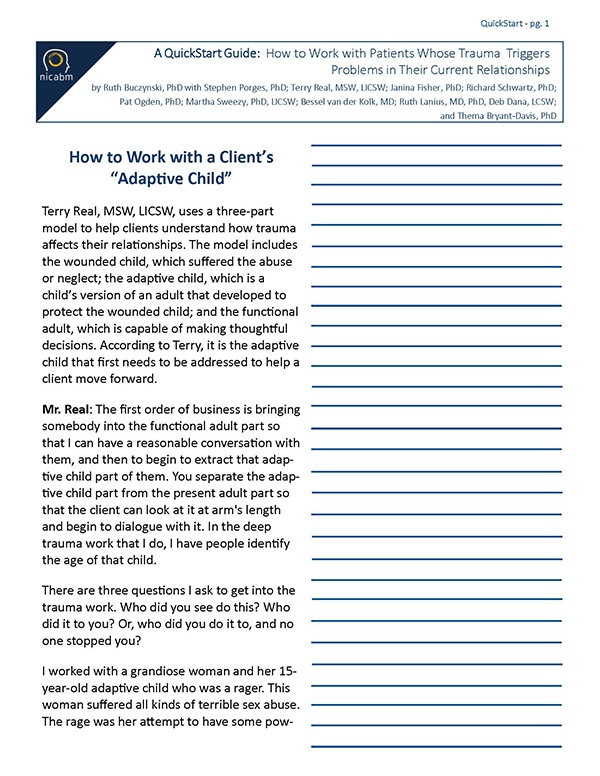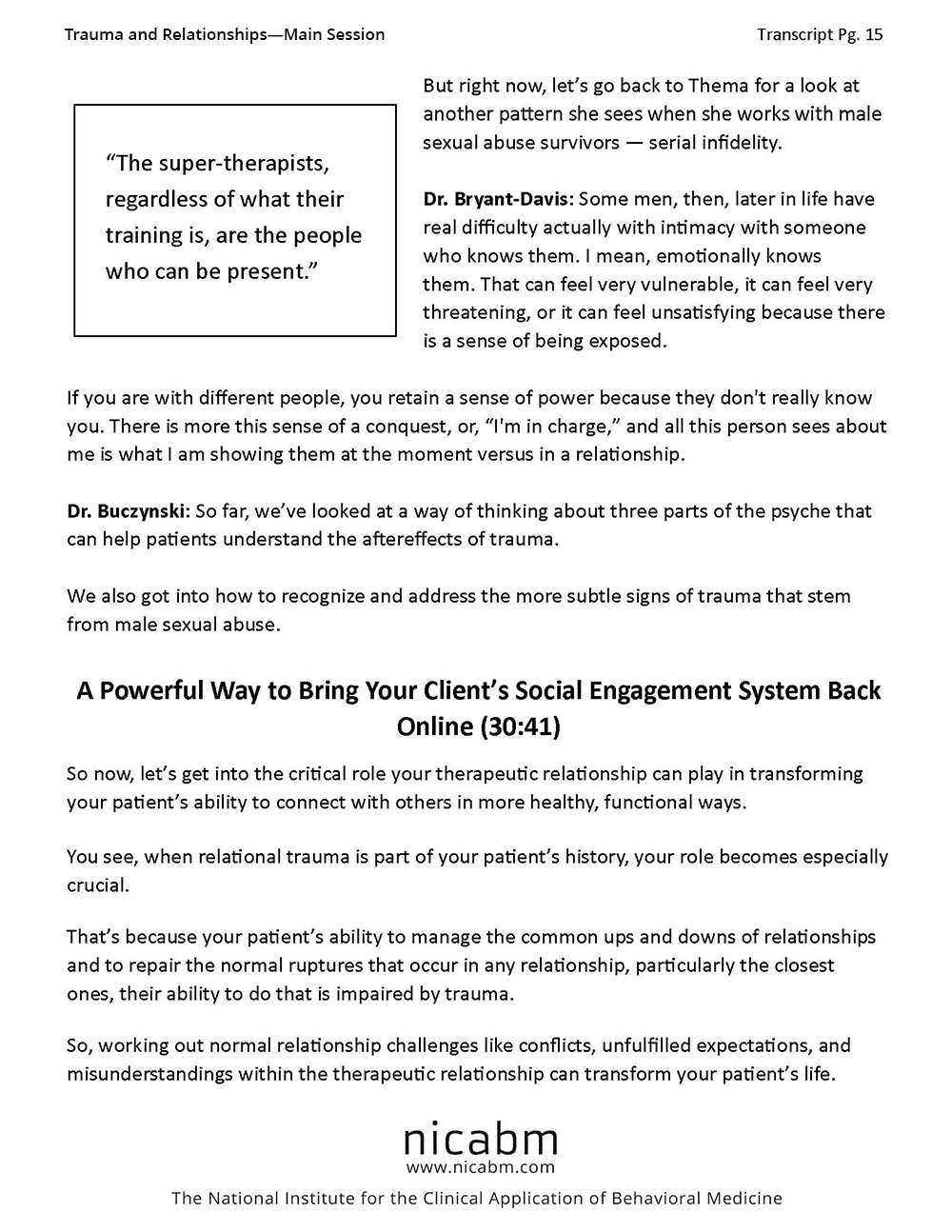Now 50% Off for a Limited Time
50% Off – Sale Ends Tomorrow
50% Off – Sale Ends Tonight
The Profound Impact of Trauma on Your Client’s Relationships (and How to Work with It)


Perhaps the most insidious impact of trauma . . .
. . . is how its aftereffects can disrupt every relationship your client has.
And without secure, healthy relationships to aid their recovery, it can be difficult to resolve the lingering symptoms of trauma.
So to help you address the aftereffects of trauma that can become embedded in your client’s relationships, we brought together 10 of the field’s leading experts.
They’ll share their best strategies to help clients forge a safe, healing sense of connection with others in the aftermath of trauma.
How to Work with Patients Whose Trauma Triggers Problems in Their Current Relationships

Strategies to Help You Home In on the Impact of Trauma on Your Patient’s Relationships
Bessel van der Kolk, MD Janina Fisher, PhD Stephen Porges, PhD
Terry Real, MSW, LICSW Richard Schwartz, PhD Thema Bryant, PhD Ruth Lanius, MD, PhD
- Two Types of Trauma That Can Knock the Social Engagement System Offline
- Specific Questions to Help Pinpoint Subtle Attachment Traumas
- A 3-Part Model to Help Patients Understand the Effect of Trauma on Their Relationships
- How to Work with the “Adaptive Child” That Is Often Activated in Relationships
- How a Patient’s “Exiled Parts” Can Harm Relationships
- Subtle Signs That a Male Patient May Have Suffered Sexual Abuse (and How to Address Them)

How to Work with Defensive Adaptations to Trauma That Can Strain Relationships
Ruth Lanius, MD, PhD Ron Siegel, PsyD Kelly Wilson, PhD
- How to Work with Couples When One Partner Freezes in the Face of Conflict
- Grounding Strategies Partners and Families Can Use When a Loved One Begins to Dissociate
- How to Help Patients Who Slip into Collapse/Submit Develop Healthier Defensive Strategies
- How to Help Patients Begin to Unravel Patterns of Pleasing and Appeasing
- How to Address the Impact of Trauma-Induced Shame on a Patient’s Relationships

Why Patients Re-enact Trauma from Past Relationships (and How to Help Stop the Cycle)
Bessel van der Kolk, MD Janina Fisher, PhD Ruth Lanius, MD, PhD
- Two Biological Factors That Drive a Patient to Re-enact Behaviors from Past Relationships
- One Key Reframe That Can Help Disrupt Unhealthy Behavioral Patterns
- Specific Language to Help Patients Better Understand the Destructive Nature of Their Behavioral Patterns

Strategies to Bring Your Patient’s Social Engagement System Back Online
Bessel van der Kolk, MD Stephen Porges, PhD Ruth Lanius, MD, PhD
- One Powerful Tool to Unlock Your Client’s Ability to Socially Engage
- Three Essential Keys to Help Patients Connect with Others in Healthier, More Functional Ways
- How to Nurture (or Repair) Your Client’s Ability to Trust Others
- How to Leverage the Therapeutic Relationship to Help Clients Connect with Others

How to Work with Couples Whose Relationship Problems Are Fueled by Past Trauma
Janina Fisher, PhD Pat Ogden, PhD Martha Sweezy, PhD, LICSW
- An Expert Strategy to Help Partners Recognize the Wounded Parts in Each Other (and Understand How Those Parts Become Activated)
- How to Help Patients Speak For Their Wounded Parts (and Not From Them)
- How to Uncover the Implicit Cues That Can Activate a Partner’s Trauma Response
Register Here for $197 $97
You’ll get all the videos, audios, transcripts, learning tools, plus 7 bonuses
to help you work more effectively with the impact of trauma on your client’s relationships
Up to 4 CE/CME Credits or Clock Hours are available for purchase at checkout.
Click HERE to get information about CE/CME credits and clock hours as well as speaker disclosures
You Are Protected By
NICABM’s Money-Back Guarantee
We invite you to register for this comprehensive training program without any risk. Unless you are completely satisfied, we will refund your money. Just let us know within 30 days from the date of registration. We are that confident that you will find this information to be more than you expected.
For This Short Course, We Brought Together Some of the Top Experts in the Field

Bessel van der Kolk, MD
Neuroscientist and Professor of Psychiatry at Boston University Medical School. Author of The Body Keeps the Score: Brain, Mind, and Body in the Healing of Trauma.

Janina Fisher, PhD
Licensed clinical psychologist and Instructor at the Trauma Center, an outpatient clinic and research center founded by Bessel van der Kolk, MD; past president of the New England Society for the Treatment of Trauma and Dissociation.

Richard Schwartz, PhD
Founder of Internal Family Systems (IFS) and The Center for Self Leadership; Author of Introduction to Internal Family Systems.

Ruth Lanius, MD, PhD
Professor of Psychiatry and Director of the Post-traumatic Stress Disorder (PTSD) research unit at the University of Western Ontario. Coauthor of The Impact of Early Life Trauma on Health and Disease: The Hidden Epidemic, and Healing the Traumatized Self: Consciousness, Neuroscience, Treatment.

Stephen Porges, PhD
Developer of Polyvagal Theory; Distinguished University Scientist at the Kinsey Institute at Indiana University Bloomington and Research Professor in the Department of Psychiatry at University of North Carolina Chapel Hill.

Terry Real, MSW, LICSW
Founder of the Relational Life Institute; Author of I Don’t Want to Talk About It: Overcoming the Secret Legacy of Male Depression and The New Rules of Marriage: What You Need to Make Love Work.

Thema Bryant, PhD
Licensed psychologist specializing in relief and empowerment of marginalized persons; Professor of Psychology in the Graduate School of Education at Pepperdine University; author of Thriving in the Wake of Trauma: A Multicultural Guide.

Pat Ogden, PhD
Pioneer in Somatic Psychology; Founder and Director of Sensorimotor Psychotherapy Institute (SPI); Co-founder of the Hakomi Institute; Author of Sensorimotor Psychotherapy: Interventions for Trauma and Attachment.

Deb Dana, LCSW
Coordinator of the Traumatic Stress Research Consortium at the Kinsey Institute; Developer of the Rhythm of Regulation Clinical Training Series; author of Polyvagal Theory in Therapy.

Martha Sweezy, PhD, LICSW
Psychotherapist, assistant professor at Harvard Medical School and consultant at Cambridge Health Alliance; co-author of Internal Family Systems Therapy.

Ron Siegel, PsyD
Assistant Professor of Psychology, part time, Harvard Medical School; Author of The Mindfulness Solution: Everyday Practices for Everyday Problems and Sitting Together: Essential Skills for Mindfulness-Based Psychotherapy.

Usha Tummala-Narra, PhD
Professor of Counseling, Developmental, and Educational Psychology at Boston College; Author of Psychoanalytic Theory and Cultural Competence in Psychotherapy; Co-author of Applying Multiculturalism: An Ecological Approach to the Multicultural Guidelines.

Kelly Wilson, PhD
Co-author of Acceptance and Commitment Therapy: An Experiential Approach to Behavior Change; Founder of OneLife Education Training, LLC.

Course Director
Ruth Buczynski, PhD
Here's What You'll Get:
Everything is yours to keep forever in your professional library
|
|
Downloadable videos so you can watch at your convenience, on any device |
|
|
Audio recordings you can download and listen to at home, in the car, at the gym or wherever you like |
|
|
TalkBack Segments to distill key ideas (this is where we “land” the session) |
|
|
Next Week in Your Practice sessions to give you concrete strategies to use with patients |
|
|
Professionally-formatted transcripts of the sessions, to make review and action simple |
|
|
Seven downloadable bonus videos to help you work with clients whose trauma triggers problems in their relationships |
You’ll Also Get 7 Bonus Sessions with Even More Strategies to Help You Work with the Impact of Trauma on Your Client’s Relationships

Bonus 1: Practical Exercises to Help Bring a Client’s Social Engagement System Back Online
Deb Dana, LCSW
- How to Help Patients Better Distinguish Between Cues of Danger and Cues of Safety
- Two Strategies to Help Revive Your Patient’s Social Engagement System

Bonus 2: Strategies to Help Families of Trauma Survivors Repair Ruptures
Deb Dana, LCSW
- How Trauma’s Imprint on the Nervous System Can Impact Intimate Relationships
- How to Work with a Parent-Child Relationship Disrupted by Trauma
- Two Practical Exercises to Help Family Members Better Understand Their Nervous System Responses

Bonus 3: How Couples Therapy Can Strengthen Your Trauma Work
Pat Ogden, PhD
- How to Effectively Implement Parts Work in a Couples Therapy Sessions
- How to Help Couples Strengthen Their Bond Through Somatic Connection

Bonus 4: Using IFS to Rewire Unhealthy Relationship Patterns in Trauma Survivors
Richard Schwartz, PhD
- An IFS Perspective on Why Patients Often Reenact Past Relationships
- A Step-by-Step Approach to Help Patients Separate Their Internal Parts
- How to Help Patients Stop Projecting Their Wounded Parts onto Their Partner

Bonus 5: Case Study – Uncovering Past Trauma That Fuels Conflict In Current Relationships
Ron Siegel, PsyD
- How to Help Clients Connect with Past Wounds They May Be Unaware Of
- How Mindfulness Can Help Clients Become More Aware of the Lingering Effects of Trauma
- Strategies to Help Clients Tolerate and Embrace Their Vulnerability

Bonus 6: Case Study – How to Navigate the Impact of Trauma on the Therapeutic Relationship
Usha Tummala-Narra, PhD
- How a Client’s Past Relationship Patterns Can Activate Your Own Response
- How to Use a Client’s Perception of You as a Springboard to Explore Past Trauma
- How to Use Skillful Self-Disclosure to Help Clients Become More Engaged

Bonus 7: Case Study – How to Work with the Impact of Past Sexual Trauma on a Client’s Current Relationships
Usha Tummala-Narra, PhD
- How to Work with Clients Who Blame Themselves for Their Sexual Trauma
- How to Address Intergenerational Trauma That Can Compound the Pain of Sexual Trauma
- Specific Cautions and Missteps to Avoid When Working with Sexual Trauma
Register Here for $197 $97
You’ll get all the videos, audios, transcripts, learning tools, plus 7 bonuses
to help you work more effectively with the impact of trauma on your client’s relationships
Up to 4 CE/CME Credits or Clock Hours are available for purchase at checkout.
Click HERE to get information about CE/CME credits and clock hours as well as speaker disclosures
You Are Protected By
NICABM’s Money-Back Guarantee
We invite you to register for this comprehensive training program without any risk. Unless you are completely satisfied, we will refund your money. Just let us know within 30 days from the date of registration. We are that confident that you will find this information to be more than you expected.
Plus, You’ll Get Practical Tools to Help You Take Action Immediately and Effectively
Synthesize Key Concepts So You Can Use Them Immediately
In the Critical Insights sessions, Ron Siegel, PsyD and Ruth Lanius, MD, PhD join Ruth Buczynski, PhD to dig more deeply into the key ideas. Our job is to make yours easier by streamlining the information from each module and making sure each point is crystal clear. We’ll clarify critical concepts and break it all down so you can gain confidence in your understanding.

Discover Concrete Practices That Will Work in Your Life, and with Your Patients
In the Focus on Application sessions, Usha Tummala-Narra, PhD, Kelly Wilson, PhD and Megan Schmidt, PsyD give you specific practices and exercises you can use with your clients right away. For each module, you’ll get solid techniques and practical interventions that will help you apply what you’ve just heard.

Uncover Core Ideas and Techniques at-a-Glance So You Have a “Cheat Sheet” When You Need It Most
The QuickStart Guide will help you stay fresh and confident as you turn these teachings into action. We’ve gathered all the essential tools and methods from the program into a concise, easy-to-use guide so you can quickly review and apply these ideas when you need them most. It’s an at-a-glance reference to the most powerful concepts and strategies for working with patients who have experienced trauma.

Quickly Recall Crucial Details So You Can Apply Them with Confidence
Our Professional Transcript will help you reinforce key ideas so you can integrate them into your life and work. We’ve designed your transcript with an easy-to-use table of contents, clear, organized formatting, and helpful highlight quotes so you’ll have the information and exercises you need at your fingertips.

Here's What Your Peers Have Experienced In NICABM Programs

. . . the content is clear, simple and the very latest insights from the most outstanding people in the field of trauma.
“These presentations are fascinating and easy to watch as the technical presentation is very good, and the content is clear, simple and the very latest insights from the most outstanding people in the field of trauma. You would need to read a lot of books to end up with as much good quality information as you get from watching this program.”
Liz Kirsopp, Psychotherapist
Northumberland, UK

This program exceeded all my expectations . . .
“I am always open to learning, and this program exceeded all my expectations. Even though I am very familiar with many of the presenters, to see them in action is inspirational. As a seasoned Art Therapist and supervisor, I am always looking for innovative ways of looking at the clients and treating their issues. I already used the knowledge I gained with clients, and especially in supervision. Having purchased the Gold Package, it is like always having a personal supervisor at my beck and call.”
Hannah Sherebrin, Art Therapist
London, Ontario, Canada

I am more confident in handling my challenging client . . .
“After this program I feel that I am more confident in handling my challenging clients. I have gained some new tools to add to my toolbox. I cannot recommend this program enough.”
Katie Stark, MA, LPC, NCC
Waterford, Michigan, USA

. . . evidenced based course to get a "helicopter" overview on trauma treatment . . .
“These NICABM 5 modules on trauma management is an excellent value for money evidenced based course to get a “helicopter” overview on trauma treatment from the professional experts.”
Su Keng Gan, Clinical Counsellor/Psychotherapist
Singapore, Singapore
Why the Transcript Is Essential:
- The transcript makes it easy to go back and double check concepts, citations and names that are mentioned
- We put in a table of contents to make it easy for you to find the exact part of the webinar you need
- Having the concepts already written allows you to take notes on how you’re going to use the ideas rather than transcribing the ideas
- Some people simply learn better by reading than by listening or watching
- You will be able to print out and share techniques presented in the session with your patients

“I really liked being able to follow along with the transcripts as I listened…it was nice not to feel like I had to take notes. I really feel like I remember more when I both hear and see at the same time.”
Mary Ellen McNaughton, Masters in Counseling, Psychology Counselor
Kelowna, British Colombia, Canada
You Are Protected By
NICABM’s Money-Back Guarantee
We invite you to register for this comprehensive training program without any risk. Unless you are completely satisfied, we will refund your money. Just let us know within 30 days from the date of registration. We are that confident that you will find this information to be more than you expected.
Register Here for $197 $97
You’ll get all the videos, audios, transcripts, learning tools, plus 7 bonuses
to help you work more effectively with the impact of trauma on your client’s relationships
Up to 4 CE/CME Credits or Clock Hours are available for purchase at checkout.
Click HERE to get information about CE/CME credits and clock hours as well as speaker disclosures